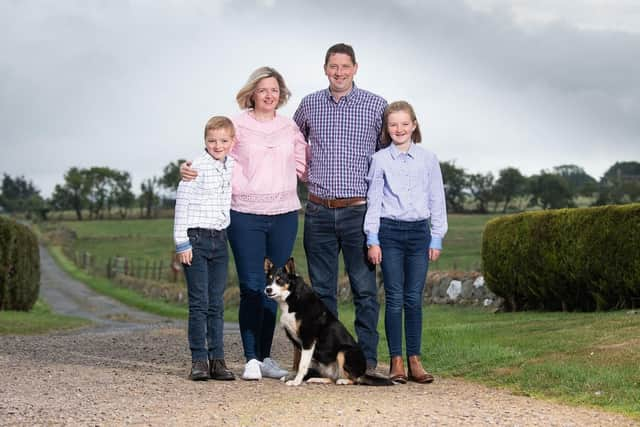Farm efficiency key to success for Scotch Beef Farm of the Year
The family farms 750 acres at Auchmaliddie Mains, near Maud with additional seasonal lets. They run about 200 predominantly Limousin-cross sucklers put to one of four Limousin bulls or an Aberdeen Angus, and buy a further 200 store cattle each year to finish. Heifers from the best performing cow lines are kept as replacements, with some also sold with calves at foot at Thainstone, while all other cattle are finished on-farm.
While the business sells finished cattle deadweight, and is also well known for its success in the commercial showing, a new venture during Covid-19 has given the family a different insight into its cattle enterprise. Now, about 30 of the farm’s homebred heifers are finished and sold as direct meat sales, either through farmer’s markets or doorstep deliveries to local customers. It is sold alongside Texel cross lamb and eggs from the sheep and hens owned by Abbie and Murray.
Advertisement
Hide AdAdvertisement
Hide Ad“It’s a lot of work, but it has been really rewarding,” says Harry. Speaking to the end customer has been a source of great feedback on meat quality and consistency, he says. “The farmer's markets are a great way to engage with the general public and tell them our story. It’s really rewarding to have a customer buy our beef and lamb who has been put off red meat or perhaps not eaten red meat for a while.”


Customers value the consistent quality of Auchmaliddie Mains beef, he says. Traceability means he can go back to the cow and bull, and uses that information to identify the best-performing animals and to ensure the family is consistently focusing on producing high quality, efficient cattle.
Their attention to detail starts with cattle health, with yearly Johne’s monitoring, calves being ear notched for BVD at birth, regular foot trimming and routine nutritionist meetings. A health plan is in place which is routinely discussed and updated with the vet, while any bought-in breeding stock is isolated, health checked and tested before entering the breeding herd.
All heifers destined for breeding are pelvic measured before bulling to ensure they are suitable for breeding with minimal assistance.
Use of technology has also helped farm efficiency, with CCTV in the calving shed meaning cows can calve in peace but be safely observed. A cattle database has also been introduced to help cut down on manual farm paperwork.
But perhaps the biggest gain of all has come from investing in a Ritchie Beef Monitor used in conjunction with compatible eartags to give EID tag reading, weighing and recording.
It is in the shed which houses about 50 finishing steers, and as cattle need to cross it in order to access the water trough, the business now has daily weights for these steers.
This allows the Browns to identify when cattle are at their optimum weight without the stress and potential set-back of putting them through a crush, and also reduces the labour requirement. Importantly, it also highlights when cattle are not performing.
Advertisement
Hide AdAdvertisement
Hide AdThe business has also recently built a new outdoor silage pit, which has cut down on the need to wrap silage, as well as increasing the farm’s storage capacity and efficiency. We are always trying to innovate and change and to improve our efficiency. There is only so far you can go with costs – and a lot is out with our control, so we are concentrating on the things we can influence.
"I think there is a lot we can still do. It’s important to keep up to date with developments as there is always room for improvement.”